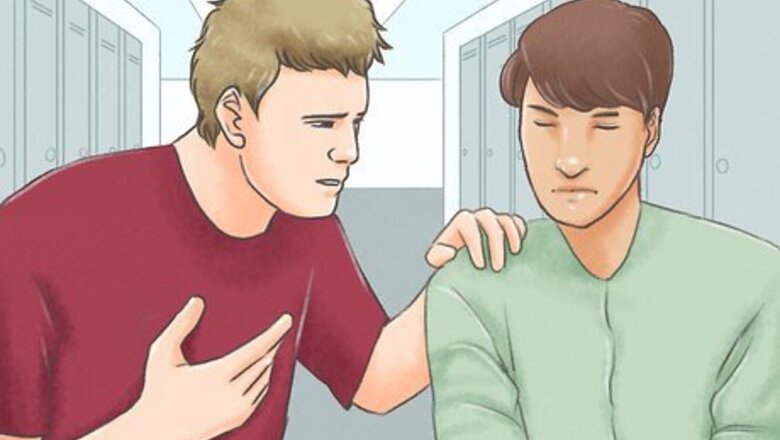
views
Preserving Friendships and Communicating
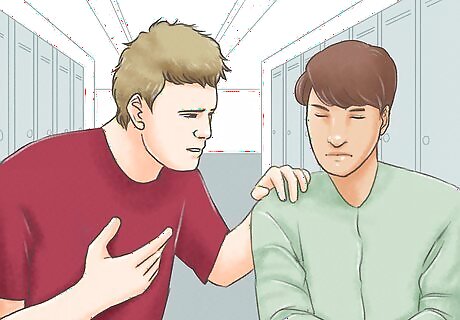
Talk with your friends. Communicating with your friends and trying to work problems through is one of the most important ways to smooth over drama. Ultimately, by opening dialogue and avenues of communication, you'll help your friends figure out a way to get past whatever drama has put your friendships at risk. Ask friends involved in drama if there is anything you can do to help. When talking to them, try to identify the problem and see if there is a larger issue going on. Talking is the only way to find out if someone is in an abusive relationship or is suffering from some other difficulties in their life. Explain that "talking it over" with a non-interested third party might help solve the problem. It might give them perspective. Don't get directly involved, but rather, be the person who is happy to listen and offer feedback.
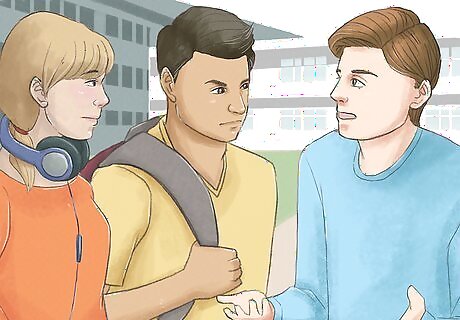
Take on the role of mediator. If talking is not enough, you might need to take action and become a peacemaker and mediator to make sure your friends and friendships stay together. If there is drama in your social circle, you can choose to try to intervene in order to avoid further complications among your friends. Remember, though, if you take on the role of mediator, you might put yourself in danger of alienating one friend in order to preserve another friendship. Make sure everyone knows you are neutral and you have the friendship of the group as your main objective. Send messages to your friends over social media that encourage them to talk about their problems with each other. Set up a meeting where you invite people involved in the drama and then act to have them work out their problems. Send social media messages to the group explaining the different perspectives of everyone involved in the drama. Relay messages between friends who are not on speaking terms.
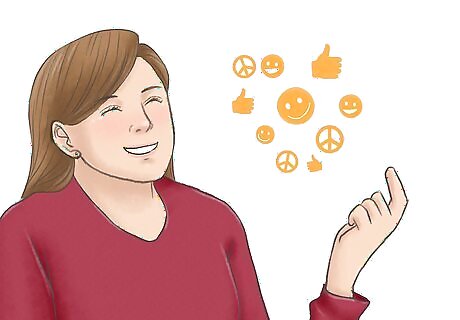
Promote a positive climate of interaction. One of the best ways to reduce drama is to promote a positive climate in which people focus on each other's positive qualities and avoid negativity. This way, drama will be averted and any drama that does occur may be overshadowed by goodwill. Root each other on, rather than being overly competitive. If we can view our friend's successes as our own successes, we'll have a more positive outlook and healthier friendships. Talk positive about everyone and give people compliments regularly. Regardless of what is happening, remind all of your friends of the good times they've had with each other and of everyone's positive qualities.

Arrange fun activities. Keeping everyone occupied by engaging in enjoyable activities will help reduce drama. This will help everyone refocus their attention on enjoying each other's company rather than recent drama. It's very possible some of your friends who have been having a rough patch might forget about their drama if they're having a really good time with each other. Organize a group get together. Have everyone bring food and drinks. Use the opportunity to make peace. Propose everyone goes out to a movie together. If the county fair is in town, try to organize an outing to the fair. Propose going to a party or another gathering where you all can relax and hangout.

Find allies who will help you reduce drama. Chances are there are others in your social circle who also want to reduce drama. Your odds of reducing drama and repairing friendships will certainly be higher if others are cooperating in your effort. Work with your friends to preserve friendships and reduce drama in the group. Talk to your friends about how you can bring peace to the group. Remember, try not to create a schism or clique in your group if it is a social group you want to maintain. But rather, use your non drama-prone friends as an anchor in a sea of drama.
Abstaining from Friend Drama
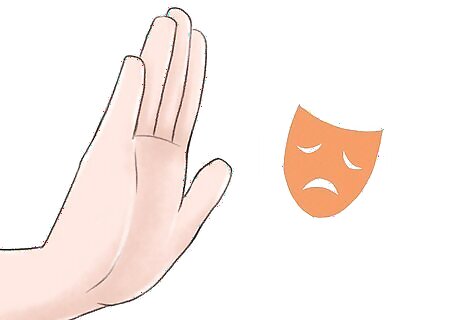
Stay away from conflict with the person or people. Ultimately, people who love drama thrive off of conflict and attention. Engaging in an argument or even a debate with someone like this will undoubtedly cause you even more of a headache. If you’ve got skin in the game on something that the drama-prone person is bothered about, try your best to avoid conflict. Remember that even if you “win” a conversation or debate, you’ll lose because the person is likely to blow things out of proportion and cause you a major headache. If you notice the person trying to create conflict with you, politely excuse yourself from the situation. If you can’t because you’re in a classroom setting or at a party and you don’t want to be rude, try to change the subject or talk to someone else. Back down, unless you want a fight. Backing down if the drama-prone person has targeted you is the best way to avoid drama and to settle the conflict. It doesn’t even really matter if you’re wrong or right. Just try to end the conflict. If the nature of your relationship is turning you into someone who is a pushover with the drama-prone person, consider ending the friendship.
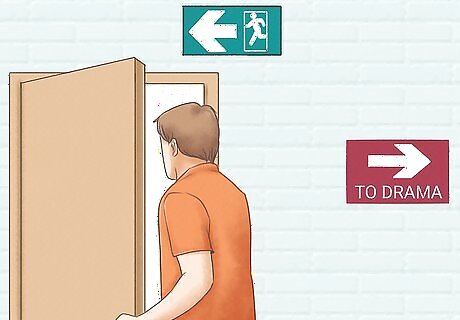
Keep your distance when you spot unhealthy drama. When you identify unhealthy drama and clearly see someone being destructive to themselves and the others around then, stay away. Avoiding drama when it is in action is the way to maintain your sanity. After all, oftentimes drama-prone people feed off of the interests and sympathy of other people. If a drama-prone person has no audience, the drama will die like a fire without fuel.
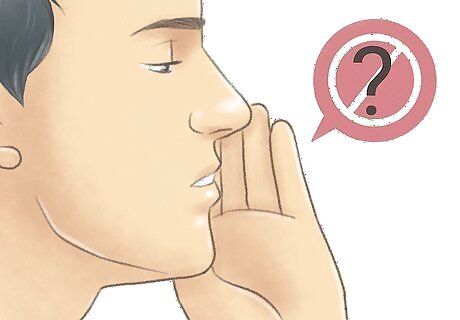
Avoid asking your drama-prone friends about things you know will rile them up. One of the most important things in managing drama is making sure you don’t feed it or provoke more. Perhaps the best way to provoke more drama is to engage your friend in a conversation about it. This will give your friend both attention and opportunity. If they feed off of drama, you’ll only make it worse. If your drama-prone friend always gets riled up over relationship issues, don’t inquire. If your drama-prone person tends to over-react about situations they’ve had with strangers, don’t encourage it by mentioning anything. If your drama-prone person likes to target other friends in your social circle, don’t bring up those people.

Limit the amount of time you’ll engage with your friends over drama. Establish firm lines about how much time and energy you’ll devote to drama within your friend circle. If you don’t, drama will wind up dominating your social life and will certainly cause you a lot of unhappiness and grief. Consider: Ending conversations after 5-10 minutes once they’ve devolved into drama. Do so politely, Tell your friends that you’ve got to do something else. Avoid phone calls or other situations that you know will devolve into drama. If your friend is calling you, and you know it’s going to be about something negative, let the phone go to voicemail. Agree to socialize in places and at events where you know you can escape if the drama is too much.
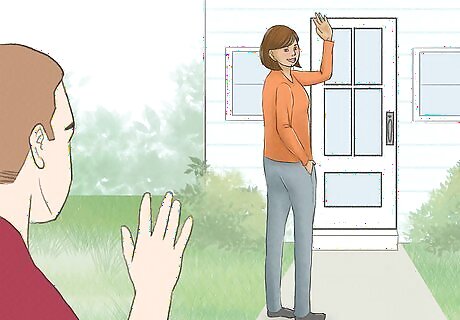
Restrict the amount of time you’ll spend with a drama prone person, but don’t cut them out. For a lot of people, a little drama might not be a bad thing. However, if you’ve got someone you like who is drama-prone, you might just want to enjoy them in small doses. This will preserve your friendship but help you keep your sanity. Plan outings with them that you know you can escape, like a festival where you’re meeting up and you know you can leave. Socialize with them only occasionally, like once or twice a month. Surround yourself with others so you don’t have to bear the brunt of the drama. Socializing with dramatic people at a party or somewhere else might be okay if you can excuse yourself to get a drink when the drama gets too intense.
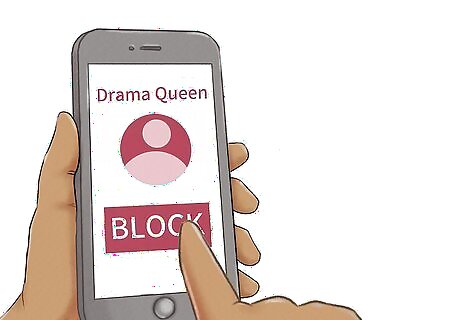
Cut people out of your life. Eliminating people from your life is one of the last things you’ll want to do if drama comes to dominate your social life. However, cutting people out entirely might be necessary if all they do is bring drama and negativity to your social life. Make sure you put a lot of thought into this before you do so. Think about making the choice to tell the person why you’re ending your relationship. However, this might result in more drama, so tread lightly. Slowly phase out of a friendship or relationship. If you’re going to cut someone out and want to avoid the drama of just disappearing, slowly phase out. Decline invitations here and there so it’s not a sudden or traumatic thing for your friend.
Figuring Out Your Social Circle

Identify drama-prone friends. At first glance, you might think that your social circle is completely dysfunctional and that perhaps you shouldn’t be friends with the people around you. Before you start ending friendships and burning bridges, try to identify the true cause of the problem. Consider: Thinking coldly and rationally about the role of everyone in your social circle. Try to set yourself apart and view your social circle objectively. You might favor certain people, but they might be the problem. Is there one person who consistently cause problems? Are there a couple people who just don’t get along?
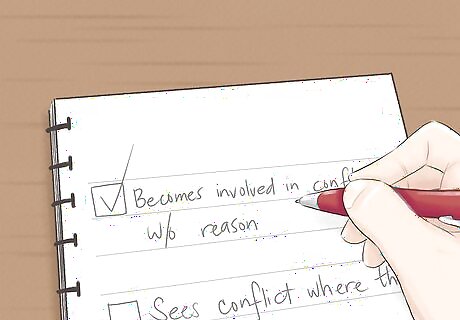
Create a checklist of drama-prone behavior so you can confirm the source of the drama. There are a number of things that drama-prone people do that others don’t. If you’ve got a substantial amount of drama in your social circle, create a little check list to help confirm the source of the drama. It might be one person, it might be a couple people, or it might the result of certain people socializing. Consider: Does someone take it upon themselves to become involved in conflict when they have no reason to be? Does someone see conflict where there probably isn’t any conflict? Does conflict seem to be normalcy for a particular individual? Does conflict arise when two or more individuals socialize?
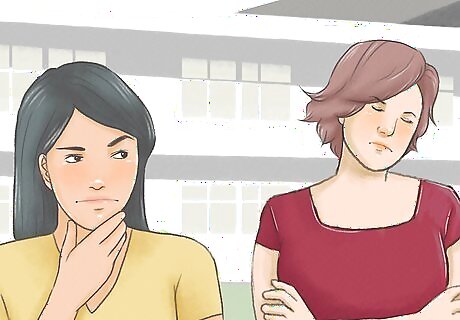
Invest some effort in understanding your drama-prone friend. Try to put some time into figuring out what motivates your drama-prone friend. Motivations for drama are often psychological in nature. Figuring out the cause of the drama might help you minimize it or at least shelter yourself from the fallout. Your drama prone friend might just be insecure. Perhaps your drama prone friend is the victim of abuse. There could be romantic rivalry or something similar among people in your social circle.
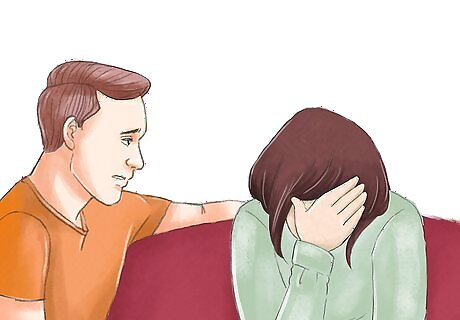
Distinguish between healthy drama and real problems. While drama is often an over-reaction to normal problems, there are real issues that could cause someone to be upset. You should be able to differentiate between drama and real problems. If you can distinguish between the two, you’ll be able to avoid unhealthy drama and offer support to a friend who is in need. Real problems can include family issues, relationship problems, and interpersonal problems and are easily confused with drama if you don’t understand the person and the issue. If your friend reaches out for help about a new issue, wants to talk about it, or wants to merely vent, allow them the opportunity. Drama can often be distinguished from real problems because it is a reoccurring issue that your friend won’t give up, won’t resolve, and won’t take any positive steps to deal with. Real problems are those that your friend will, after some thought, try to resolve positively and through communication.




















Comments
0 comment